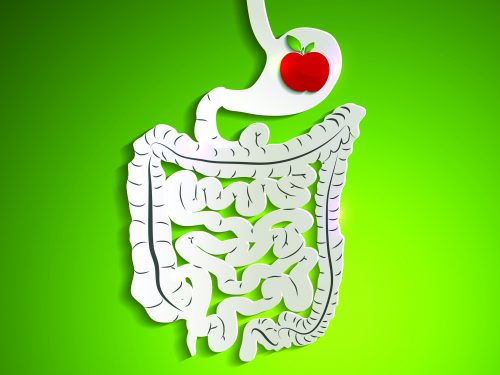
Dietitian Katrina Pace explains how your digestive system works to process the food you eat.
Did you know the sight, smell or even just the thought of food is enough to start your digestive system kicking into action? I’ll show you how. Take a moment to think of your favourite food. Maybe an ice cream, roast chicken or cheese toastie. Now, think about what’s going on in your mouth. Is it starting to fill with saliva? Do you have to swallow? Well, that’s the first sign your digestive system is getting ready to do its thing.
What’s it all about?
The purpose of your digestive system is to break down food into smaller particles so it can be used appropriately by the body.
These smaller substances can then be moved by the body from the digestive system and into the bloodstream where they are used for building cells, enzymes, hormones and anything else our body needs.
Another function for the digestive system is to act as a physical and immune barrier to things that shouldn’t get through into our bloodstream.
What is your digestive system?
A system is a group of parts working together as an interconnecting network, and that’s exactly what your digestive system is. This system starts at the mouth and ends up all the way down at the bottom: the rectum and anus. After you put food or drink in your mouth, it’s mixed with saliva as we chew.
Saliva contains an enzyme that starts the digestion of carbohydrates. When you’ve chewed your food, you swallow and it goes down your oesophagus, a long tube that connects your mouth to your stomach (your stomach sits just under your ribcage, at the front of your body). The oesophagus squeezes the food as it is swallowed, making it smaller and mushier. If you don’t chew bread or meat well, you can sometimes feel it going down your chest. Your stomach is where digestion really gets going. Changes in acidity in the stomach, caused by food, trigger cascades of enzymes and hormones. Enzymes start the breakdown of protein, fats and starches. Hormones and neurotransmitters trigger feelings of fullness and alert the rest of the digestive system to get ready to digest food. The stomach makes about 2-3 litres of gastric fluid each day. The food is watery now it’s been mixed with all this fluid.
Next stop – the small intestine. The small intestine is about 3-5 metres long and wrapped up tight in your abdomen. As well as being long, the inside of the small intestine is covered in little finger-like bulges, called villi. These give it even more surface area to help our body absorb nutrients. This is the main role of the small intestine – getting the food particles to the right form to be transported into the blood stream, so they can be whisked off round the body to do their work. The pancreas and gallbladder add extra salts, enzymes and hormones to help this process.
Bacteria that live in your small intestine help keep its cells healthy and also produce nutrients and hormones.
After all the goodies have been taken out of the food, what are you left with? Well, that’s the fibre, old cells, waste products and dead bacteria. The stuff we usually call poo. The large intestine, or bowel, is where the final bit of water is squeezed out of the food and digestive waste, any leftover carbohydrates are fermented by bacteria and small amounts of vitamins and proteins are made.
Finally, these leftovers from the digestive process are removed from the body through the anus.
How long does this all take?
Well, your breakfast will be down to your small intestine by mid-afternoon, but it will take another day or so for the remains of it to be completely out of your body. But irritants such as spicy food, alcohol or coffee may speed things up, and not enough water or exercise may slow things down.
Digestive distress
Signs that your digestive system may not be functioning well are indigestion, heartburn (reflux), tummy pains, bloating and gas.
You may experience a change in your bowel habits (diarrhoea or constipation) or start developing food intolerances.
Other signs include vitamin and mineral deficiencies that happen when the body can’t harvest the nutrients effectively.
Medications, stress, hormones, sudden dietary changes, food poisoning, gastro bugs or travel can all affect how our digestive system works. One common cause of digestive issues is mistaking low stomach acid levels for high (reflux), and treating yourself with antacids.
If your stomach isn’t at the right level of acidity, then some digestive enzymes and hormones aren’t triggered, so the rest of your digestive process is affected.
If you think you have acid reflux, make sure you get it checked out with your doctor.
The longer you experience digestive distress, the more likely it is to affect your body’s absorption of nutrients, the balance of bacteria in your system and your overall health, regardless of how healthily you eat.
After all, your digestive system is responsible for producing the building blocks for ensuring a healthy body.
From this to that: Digestive enzymes explained
Our bodies need a host of digestive enzymes to extract nutrients from our food. How the nutrients are packaged in food and drink is not how our body can use them. Imagine fat, carbohydrates and protein as necklaces, with long strings of beads on them. Digestive enzymes cut up the necklace so there are only a few beads on each string. Other enzymes then cut them down to only one bead per string. In this simple form, fat, carbohydrates and protein can then be used by the body.
Amylases break down carbohydrates. They’re found in saliva or released from the pancreas. Some types of fibre and gums can’t be digested by human amylase. They pass through to the large intestine, where some are fermented by bacteria.
Proteases break down proteins. An increase in acidity in the stomach activates a protease called pepsin that starts protein digestion. Other proteases are released by the pancreas. It is pepsin that is needed most to break down meat protein. Any undigested protein is fermented by bacteria in the large intestine.
Lipases break down fats. Most fat digestion happens in the small intestine. Bile acids are also needed to help fat digestion. Fatty meals slow down digestion in the stomach, and can stay in the stomach for up to four hours.
Lactase breaks down lactose (milk sugar). People with lactase deficiency can buy tablets containing lactase from pharmacies to help digestion.
If you don’t chew your food properly, don’t have enough acid in your stomach, or are missing enzymes, then your digestive system won’t work properly.
Signs of a healthy digestive system
If your digestive system is working in tip-top condition, the rest of your body will get the nutrients it needs to build hormones, neurotransmitters, skin cells and muscles. If you are eating a well-balanced, healthy diet, but experiencing poor wound healing, hormonal imbalances, bad skin or low mood (and no other cause has been found), it may be worth thinking about how your digestive system is working.
One of the key signs to having a healthy digestive system is that it’s not causing you any problems. You don’t have bad breath, a sore tummy or bloating. Your bowels open once or twice a day, and you don’t have to strain or wear a gas mask when you do.
Your appetite is moderate and you don’t (or rarely) experience food cravings. You don’t have low iron stores and your immune system works well. You are, in general, feeling and looking well.
Tips for maintaining a healthy digestive system
Chew your food
Chewing your food is the first step in breaking it down and getting it ready for digestion. Eating too fast and not chewing properly means the rest of the digestive process is affected by the stomach not being presented with smaller particles of food. Slow down and enjoy your whole eating experience.
Fibre, fibre, fibre
Fibre is the favourite food of the bacteria that live in our digestive system. Eating a diet high in wholegrain, fruit and vegetable fibres has been shown to give us the healthiest balance of bacteria which, in turn, can help keep us healthy. Not only that, but having plenty of fibre can increase the speed at which food goes through our large intestine, preventing constipation. Fibre also creates bulk that helps the bowel muscles work. Like any muscle in the body, the bowel muscle needs exercise too, and that’s what fibre can do.
Get enough to drink
With plenty of fibre, you need plenty of fluid. Fibre absorbs fluid as it goes through the digestive system, so getting dehydrated can lead to rock-hard poo.
Pick up problems quickly
Problems such as frequent bloating, reflux, tummy pains, bad breath or even food poisoning or gastro bugs can have lasting effects on your digestive system. For any concerns about your digestion, head straight to your GP to discuss your problems.
www.healthyfood.com











